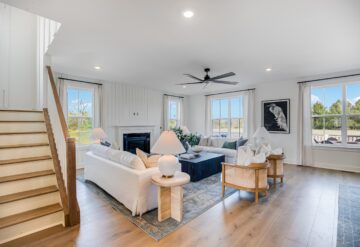If you’re considering purchasing a new home – especially your first home – this U.S. News article by Teresa Mears highlights some of the ways you can obtain a home loan with a low down payment.
For someone who is thinking of buying a first home, the idea of saving enough money for a 20 percent down payment can be daunting. The good news is a first-time buyer can purchase a home for a little as 3 percent down – and even no money down in some cases.
“The narrative that in order to buy a house in America today you need 20 percent down is just not true,” says Marietta Rodriguez, vice president of national homeownership programs and lending for NeighborWorks America, a national nonprofit focused on community development and homeownership. “There are a lot of different products that offer low down payment options.”
If you otherwise qualify for a mortgage, you can qualify for one with a lower down payment, though some options are only available to those with good credit. But you will pay more. That’s partly because if you pay less upfront, your mortgage balance is higher. Another reason is if you don’t make a minimum down payment of 20 percent, you will usually be required to pay private mortgage insurance.
PMI, as it is commonly known, protects the lender if you default on your loan. On a conventional loan, it’s usually added to your monthly payment. For loans offered by the Department of Veterans Affairs, the U.S. Department of Agriculture and the Federal Housing Administration, mortgage insurance is handled differently.
“The less you put down, the higher the mortgage insurance is,” says Casey Fleming, author of “The Loan Guide: How to Get the Best Possible Mortgage” and a mortgage professional in the San Francisco Bay Area. “With 5 percent down, the mortgage insurance is quite high.”
The cost of private mortgage insurance depends on your credit score and the size of your down payment. Freddie Mac estimates the cost at $30 to $70 per month for each $100,000 borrowed. The Freddie Mac website calculates that if you buy a $200,000 home with 10 percent down with a 30-year fixed rate of 4.5 percent, you’ll pay $80.75 a month in PMI (at a rate of 0.51 percent), in addition to the $962 monthly principal and interest payment (taxes and insurance are added on top of that). With 20 percent down, you’ll pay $810.70 per month.
If you need to pay PMI, the size loan you can get will be slightly smaller, to allow for the bigger payment. With a conventional mortgage, you can get an appraisal and write to your lender and ask to have the PMI removed once you have more than 20 percent equity in the home. With FHA loans, PMI lasts for the lifetime of the loan.
“Anyone with decent credit can get a loan,” Fleming says. “The limiting factor will always be the PMI.”
If you have a choice, should you make a bigger down payment to avoid PMI? It depends on your personal circumstances. You need to make sure you have enough cash on hand for closing costs and repairs. Some lenders will require a certain level of reserves before they will grant the mortgage.
“There’s really no hard and fast rule out there,” Rodriguez says. “Inasmuch as they have a choice, and have something to put down, they can run through different scenarios.”
Even with no down payment, homebuyers still need some cash to cover closing costs and upfront costs, such as a year’s worth of taxes and insurance. Some loan programs allow buyers to use a contribution from the seller or a gift from family for closing costs and down payments, but others do not.
“That means you need to be putting money aside,” says Sandee Rains, a financial education specialist in Tampa, Florida, with the nonprofit ClearPoint Credit Counseling Solutions.
If you’re considering buying a home, it’s smart to meet with a mortgage officer or broker before you start looking at property. “Sit down with somebody who can show you what all the costs are really going to be,” Fleming says. A good mortgage broker can help you weigh your options and decide how large a down payment to aim for, as well as which loan program is the best option.
Rodriguez suggests consulting a financial counselor who can examine your financial life in its entirety. “It’s really to help you plan your financial future,” she says. “Homeownership might be only one of those goals.”




